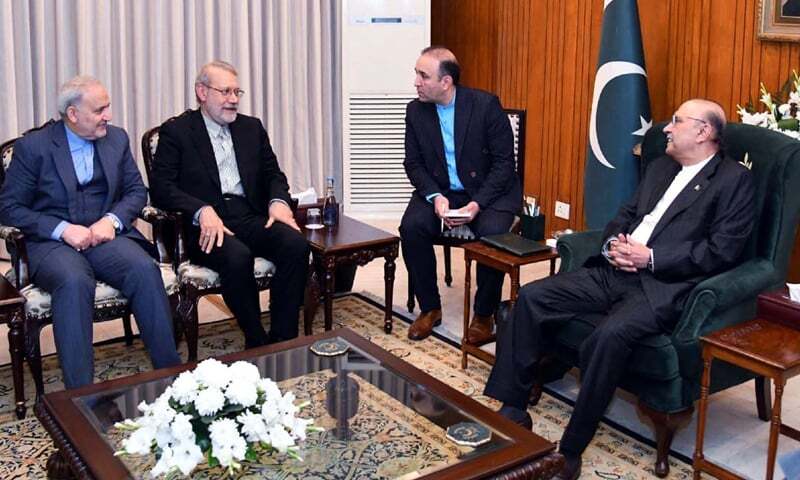Pakistan, Iran look to align on major fronts


ISLAMABAD: Ali Ardeshir Larijani, secretary of Iran’s Supreme National Security Council, on Tuesday discussed ways to deepen economic cooperation, besides coordinating positions on regional and international developments, particularly the Gaza peace plan, in meetings with Pakistan’s civilian leadership.
The top Iranian security official, who began a two-day visit to Islamabad by holding talks with President Asif Ali Zardari, Prime Minister Shehbaz Sharif, National Assembly Speaker Ayaz Sadiq and Deputy Prime Minister and Foreign Minister Ishaq Dar, is scheduled to meet Chief of Army Staff Field Marshal Asim Munir and National Security Adviser and ISI chief Lt Gen Asim Malik on Wednesday.
The visit is focused on reviewing bilateral ties, pursuing pending agreements and discussing regional developments, including those in the Muslim world.
After landing in Islamabad, Mr Larijani told reporters “changing conditions of the region necessitate enhanced cooperation across multiple fields”, while noting Pakistan’s “privileged position” in shaping regional security.
Gaza peace on the table as Larijani discusses regional, global issues with civilian leadership; will meet army, intel chiefs today
The trip comes as Iran expressed reservations about US President Donald Trump’s Gaza plan, now moving into its implementation phase after being adopted by the UN Security Council on Nov 17. The initiative includes an international stabilisation force for Gaza, a move Tehran fears could entrench foreign military involvement. Pakistan has supported the plan and is seen as a potential contributor to the force.
Though the various statements on the top security council official’s meetings by the Pakistani side didn’t say much on discussions about Gaza peace plan, the Iranian official in a post on X at the end of the day, conveyed greetings of Iranian Supreme Leader Ayatollah Khamenei to “honourable people of Pakistan” for supporting Iran during the 12-day war with Israel and said it showed the “firm and principled thinking of the Pakistani people”.
In what many saw a possible balance act, Mr Larijani in the same post on X said, “We extend our gratitude to the government, the parliament, and the armed forces of Pakistan.”
The PM Office said Shehbaz Sharif and Mr Larijani exchanged views on major regional and international developments and “stressed the importance of coordinated efforts to promote peace and stability.”
The premier expressed appreciation for Iran’s engagement, while the Iranian official thanked Pakistan for its role in advocating dialogue and diplomacy for peaceful settlement of disputes, possibly a reference to Islamabad’s role of a messenger between Tehran and Washington.
The two sides agreed that a delegation led by Deputy PM and Foreign Minister Ishaq Dar would soon visit Tehran to advance cooperation, particularly in agriculture and connectivity.
The Foreign Office said Mr Dar and Mr Larijani reaffirmed their commitment to strengthening bilateral ties and expanding cooperation on regional and international issues.
In comments to Iran’s state news agency IRNA, the deputy premier said he held “detailed and frank discussions” with Mr Larijani, adding he was “very pleased” with the visit. The security official told IRNA the talks covered economic progress, ways to expand cooperation, and regional and international developments.
During his call on President Zardari, cooperation in energy, commerce and railways were discussed.
The president underscored Pakistan’s desire to boost trade with Iran and pressed for strengthening the rail link to facilitate commerce and travel, especially for religious pilgrims. He emphasised the need for a “mutually workable solution” on the stalled Iran-Pakistan gas pipeline, citing Pakistan’s growing energy needs, and welcomed technical discussions held recently in Islamabad.
Mr Larijani said directives issued after the Iranian President Pezeshkian’s visit to Pakistan in August including for preferential access for Pakistani products had set the path toward achieving the $10 billion bilateral trade target.
Mr Larijani also met NA Speaker Ayaz Sadiq at Parliament House, where they discussed parliamentary cooperation, regional security and opportunities for expanded economic engagement.
His trip follows a visit by Iranian parliament speaker Bagher Ghalibaf last month, marking the second senior Iranian delegation to Islamabad in weeks and underscoring intensified diplomatic activity between the neighbors amid shifting regional dynamics.
Iran and Pakistan share a long, often tense border where terrorist groups have carried out attacks on both sides, prompting growing security coordination. Tehran has also offered to mediate between Islamabad and Kabul as cross-border tensions are rising.
Published in Dawn, November 26th, 2025



